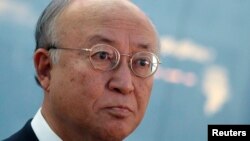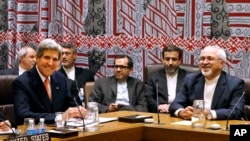The head of the U.N. nuclear agency says it will "take some time" for his organization to prepare to monitor a landmark nuclear deal between Iran and six world powers.
The agreement, signed Sunday in Geneva, calls for Iran to limit or freeze sensitive parts of its nuclear program for six months in return for limited relief from international sanctions. But no start date for the deal has been announced.
Inspectors from the International Atomic Energy Agency will monitor Iran's compliance. IAEA chief Yukiya Amano said Thursday the U.N. agency needs some time to analyze the implications of the new duties on its funding and staffing. He made the remarks at a meeting of the IAEA's 35-nation board in Vienna.
World powers including the five permanent members of the U.N. Security Council plus Germany pressed for the Geneva deal as a first step toward ensuring that Iran's nuclear activities have no military components. Iran says those activities are for peaceful civilian purposes, but Western powers suspect they are a cover for making bombs.
IAEA inspectors have been monitoring some of Iran's nuclear sites for years to ensure its compliance with international nonproliferation obligations. Diplomats in Vienna told Western news agencies the IAEA is unlikely to be ready for expanded monitoring of additional Iranian sites until January.
View an interactive timeline of Iran's negotiations with world powers on its nuclear program.
IAEA chief Amano also said Iran will permit inspections of a key facility at its Arak nuclear complex as part of separate agreement with the U.N. agency.
Amano said Tehran has invited the IAEA to inspect the Arak heavy water plant on December 8, in what will be the first such visit in two years. The nuclear plant produces heavy water intended for use in a nearby reactor that is under construction. IAEA inspectors have been able to access the reactor.
Iran and the IAEA agreed earlier this month to open the heavy water plant to inspections to enable the agency to carry out its long-standing mandate.
Iran later promised the six world powers in Geneva to refrain from making further advancements in the Arak complex for six months. Western powers fear Iran could use the reactor to produce plutonium for developing nuclear weapons.
Under the Geneva deal, Iran also promised to limit production of enriched uranium, another compound that can be used for nuclear bomb-making, when purified to a high level.
The agreement calls for Iran to stop enrichment above the 5 percent level and dilute its stockpile of uranium enriched to 20 percent, which is close to weapons-grade.
Iranian state news agency IRNA quoted Iran's nuclear chief Ali Akhbar Salehi as saying the country plans to increase its enrichment of low-level uranium. In a report published Thursday, Salehi said centrifuges previously producing 20 percent enriched uranium will be switched to producing uranium below the 5 percent level.
The agreement, signed Sunday in Geneva, calls for Iran to limit or freeze sensitive parts of its nuclear program for six months in return for limited relief from international sanctions. But no start date for the deal has been announced.
Inspectors from the International Atomic Energy Agency will monitor Iran's compliance. IAEA chief Yukiya Amano said Thursday the U.N. agency needs some time to analyze the implications of the new duties on its funding and staffing. He made the remarks at a meeting of the IAEA's 35-nation board in Vienna.
World powers including the five permanent members of the U.N. Security Council plus Germany pressed for the Geneva deal as a first step toward ensuring that Iran's nuclear activities have no military components. Iran says those activities are for peaceful civilian purposes, but Western powers suspect they are a cover for making bombs.
IAEA inspectors have been monitoring some of Iran's nuclear sites for years to ensure its compliance with international nonproliferation obligations. Diplomats in Vienna told Western news agencies the IAEA is unlikely to be ready for expanded monitoring of additional Iranian sites until January.
INTERACTIVE Iran Nuclear Timeline
View an interactive timeline of Iran's negotiations with world powers on its nuclear program.
Amano said Tehran has invited the IAEA to inspect the Arak heavy water plant on December 8, in what will be the first such visit in two years. The nuclear plant produces heavy water intended for use in a nearby reactor that is under construction. IAEA inspectors have been able to access the reactor.
Iran and the IAEA agreed earlier this month to open the heavy water plant to inspections to enable the agency to carry out its long-standing mandate.
Iran later promised the six world powers in Geneva to refrain from making further advancements in the Arak complex for six months. Western powers fear Iran could use the reactor to produce plutonium for developing nuclear weapons.
Under the Geneva deal, Iran also promised to limit production of enriched uranium, another compound that can be used for nuclear bomb-making, when purified to a high level.
The agreement calls for Iran to stop enrichment above the 5 percent level and dilute its stockpile of uranium enriched to 20 percent, which is close to weapons-grade.
Iranian state news agency IRNA quoted Iran's nuclear chief Ali Akhbar Salehi as saying the country plans to increase its enrichment of low-level uranium. In a report published Thursday, Salehi said centrifuges previously producing 20 percent enriched uranium will be switched to producing uranium below the 5 percent level.






